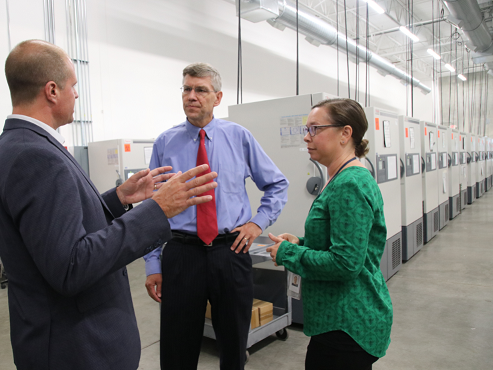A strong supporter of the cellular transplant community, Congressman Paulsen sponsors the PACT Act (H.R. 4215) to help hospitals protect access to marrow and cord blood transplants for Medicare beneficiaries
August 27 2018
Today the National Marrow Donor Program® (NMDP)/Be The Match® welcomed Congressman Erik Paulsen (MN-3) to tour its innovative facility for inspecting, processing, and storing millions of potential marrow donor samples and research samples from transplant recipients and their donors. As one of the largest research storage facilities in the world, the NMDP/Be The Match Biorepository houses more than 10 million blood samples that are being used to register volunteer donors to support treatment of blood cancers such as leukemia and lymphoma, as well as research samples to conduct studies to advance the science of transplantation.
“With more than 1.3 million Americans suffering from cancers of the blood and a new patient being diagnosed every 3 minutes, expanding access to cord blood and marrow transplants is critical,” said Stephen Spellman, M.B.S., director of immunobiology research and assistant scientific director in the Center for International Blood and Marrow Transplantation Research (CIBMTR), a research collaboration between the NMDP/Be The Match and the Medical College of Wisconsin. “By preserving blood samples for use by scientists all across the globe, the Biorepository provides the opportunity to conduct research and develop curative treatments for millions of blood cancer patients.”
.jpg)
Congressman Paulsen is a lead co-sponsor of the Protect Access to Cellular Transplant (PACT) Act (H.R. 4215), which would help hospitals expand access to marrow and cord blood transplants for Medicare patients. Under current Medicare payment policy, hospitals that provide cord blood and marrow transplants are reimbursed at rates far below the cost of acquiring the cells, performing the transplant, and providing necessary inpatient care, which typically involves a 20- to 30-day hospital stay.
Unlike solid organ transplants for which Medicare reimburses hospitals separately for the cost of acquiring organs and providing related inpatient care, hospitals that perform cellular transplants receive just a single inpatient base reimbursement rate of approximately $71,000 — well below the actual cost of care. As a result, many hospitals are unable to provide the only potentially curative treatment for blood cancers and other blood disorders to Medicare patients.
If enacted into law, the PACT Act would address this problem by adjusting the Medical Severity Diagnosis Related Grouping (MS-DRG) reimbursement for hospitals that provide bone marrow, peripheral blood stem cell (PBSC) and cord blood transplants (cellular transplants) to Medicare patients. Currently, approximately 1,200 Medicare patients receive a cellular transplant every year. Hospitals cannot continue to sustain such significant financial losses and patient access is at risk. The PACT Act would make it easier for hospitals to offer life-saving cellular transplants to Medicare patients in need.
“We are honored to host Congressman Paulsen and thank him for his steadfast support for the cellular transplant community,” said Brian Lindberg, chief legal officer and general counsel, chief policy officer of NMDP/Be The Match. “As we continue to advocate for patients’ blood cancers and other blood disorders, we look forward to working closely with Congressman Paulsen and his colleagues on Capitol Hill to pass the PACT Act so that Medicare patients can rest assured that their access to life-saving transplants won’t be compromised by outdated payment policy.”

